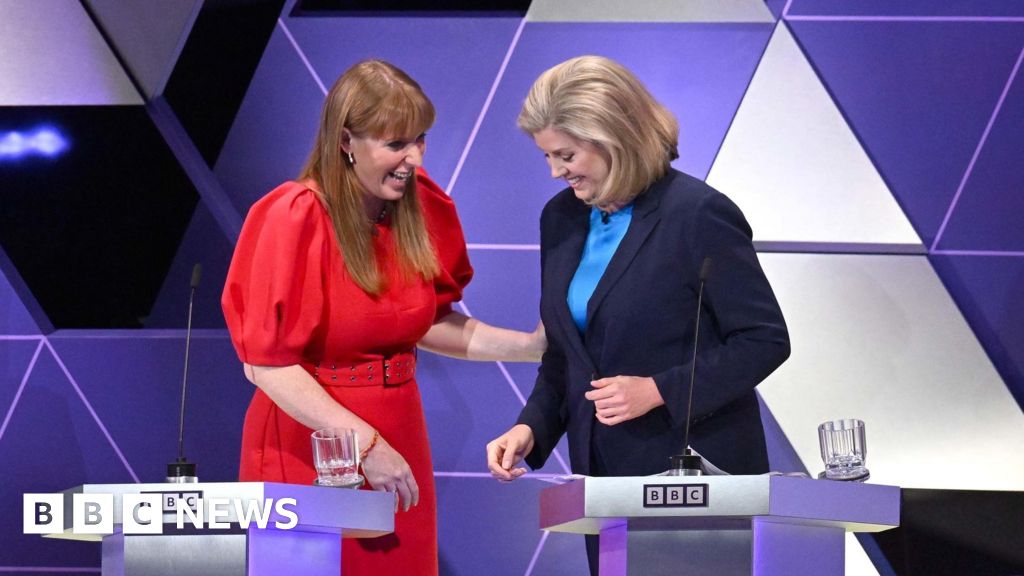2 days ago
By Kate Whannel, Political reporter
D-Day, taxes and the NHS: Moments from the BBC debate
Representatives from the major parties in Great Britain faced each other in a seven-way debate ahead of the general election on 4 July.
Here is what we learned:
1. Mordaunt joins D-Day criticism of Sunak
Rishi Sunak’s early exit from the D-Day commemorations in France had been the dominant electoral story of the day, ahead of the debate.
Reform UK leader Nigel Farage was the first to bring it up. He called the PM’s actions “disgraceful” and said veterans had been deserted.
Liberal Democrat deputy leader Daisy Cooper said it was “politically shameful”, bringing up her grandfather, who was on the Normandy beaches on D-Day.
Conservative minister Penny Mordaunt, was not quite as blunt but did say the PM’s choice to leave prematurely had been “completely wrong”. Unlike other Tories today, she did not go on to speak about Mr Sunak’s commitment to the armed forces and veterans.
As well as coming close to criticising her current leader, she had a swipe at his predecessor and her former Tory leadership rival.
“Even Liz Truss on her worst day still recognised that we need a nuclear deterrent in this country”, she said in an attack on Angela Rayner.
Ms Rayner insisted she was fully behind the UK’s nuclear deterrent and her party’s “triple lock” on it.
2. Things got very heated between Mordaunt and Rayner
Angela Rayner and Penny Mordaunt exchanged angry words, but appeared to remain friends at the end
The random drawing of lots meant Angela Rayner and Penny Mordaunt were stood side-by-side and it didn’t take long for the pair to start knocking verbal lumps out of each other.
Ms Mordaunt repeatedly jabbed a finger at her Labour opponent as she criticised her stances on the nuclear deterrent, immigration and taxes.
Labour’s deputy leader deployed heavy eye rolls and hard stares as she listened and, when it was her time to talk, took every opportunity to remind the audience that the Conservatives had, in her words, “crashed the economy”.
At many times in the debate the rest of the participants looked on, as these two quarrelled.
“Well that was dignified wasn’t it,” the Green Party’s Carla Denyer said to laughter following one particularly tetchy exchange.
“Can we have a shot,” asked the SNP’s Stephen Flynn at one point.
3. Flynn landed blows on public service cuts
Stephen Flynn, the Scottish National Party’s Westminster leader, did well with the audience in the BBC’s Radio Theatre, winning plenty of applause.
He was clapped for pointing out that students in Scotland don’t pay tuition fees and for his defence of immigration as being “essential” to public services and businesses.
He also brought up Brexit – a subject that dominated the last election but got little attention during the debate between Sir Keir Starmer and Rishi Sunak on Tuesday evening.
Mr Flynn accused Mr Farage of being a “snake oil salesman” and Labour of “silence” on the issue.
Responding to his attack on Brexit, Ms Mordaunt said UK exports were at a “record high”.
One thing Mr Flynn didn’t mention was the subject of Scottish independence.
4. Farage comes under most fire from Plaid, the Greens and the SNP
Penny Mordaunt largely ignored Nigel Farage, appearing reluctant to attack him head on.
The same couldn’t be the said of the smaller parties.
The Green Party’s Carla Denyer accused the Reform UK leader of being “cold-hearted” for not wanting immigrants coming to the UK to work to be able to bring their partner or child.
Plaid Cymru’s leader Rhun ap Iorwerth said Mr Farage was acting in “his own self interest”.
He also accused the veteran Brexiteer of using D-Day as a photo opportunity. Mr Farage hit back pointing out he had been raising money to help veterans get to Normandy for the commemorations.
He claimed it was “one versus six” over immigration, arguing that Britain was living through a “population crisis”.
5. Tuition fees bring back bad memories for Lib Dems
Possibly the most frank moment of the night came from the Liberal Democrat’s deputy leader Daisy Cooper.
She admitted that her party’s decision to break its promise and back a rise in tuition fees – when it was in coalition with the Conservatives in 2010 – was a “sore subject for us, for sure”.
“That was a very difficult decision”.
6. The NHS was a major flashpoint
The NHS has been described as being a national religion, but Mr Farage suggested the UK could learn lessons from the French.
He argued the current model was wrong adding: “The more money we spend, the less delivery we get.”
The SNP’s Stephen Flynn intervened to suggest Mr Farage did not believe in the NHS. “You want to privatise it, that is what you want to do.”
“It already is,” Mr Farage replied.
Lib Dem Daisy Cooper argued that the key thing wasn’t the model but the amount of funding.
7. Smaller parties assume Labour victory
Angela Rayner used her final 30-second statement to attack Penny Mordaunt. Ms Mordaunt returned the compliment.
But then three of the remaining five politicians took it as given that Labour have won the election. Stephen Flynn said “the Tories are finished” – so did Plaid’s Rhun ap Iorwerth.
Nigel Farage said: “Labour are going to win – the debate is who forms the opposition in the next Parliament.”
To some extent the argument that the election is over is something every smaller party is always going to say, as they try to persuade people they will not be wasting their vote by opting for them.
But there are clear dangers for Labour in the idea that the election is a foregone conclusion.
Labour will not want any of their voters to think they do not need to turn up to the polls on 4 July.



